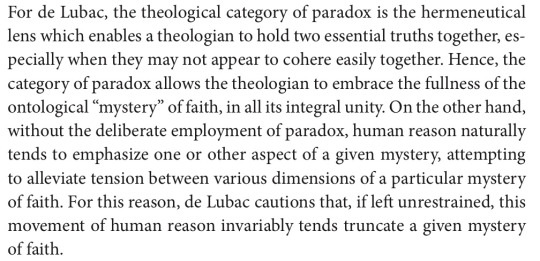#henri de lubac
Text
It is necessary to believe that there exists a Church which is one, holy, and catholic. As regards the three Persons of the Trinity, Father, Son, and Holy Spirit, we believe in them in such a way as to place our faith in them. But now, changing our mode of expression, we declare that we believe the holy Church and not in the holy Church. Thus, just by this difference in language, God, who is the Author of all things, is distinguished from all His creatures; and when we receive all the precious blessings which He has conferred on His Church, we attribute them to His divine goodness.
- The Catechism of Trent (1.9.23). Bolded emphasizes added.
We must not believe in anyone but God. [...] I believe the holy Church, apostolic, universal, and orthodox, which has taught us this sound doctrine. I do not believe in Her as I believe in God, but I confess that She is in God, and God is in Her, not as though She Herself contained God, but rather insofar as She is Herself contained by God.
- John of Fécamp (Confessio fidei, Chapter 26)
The Creed says: credo ecclesiam, not in ecclesiam. One cannot believe in the Church —the holy Church— as one believes in God, the Father, Son, and Holy Spirit. According to this third article, one can believe only in God, in the Holy Spirit, and it is by knowing and confessing his work that one can believe the Holy Church exists, can believe that forgiveness of sins is granted by the Holy Spirit to man; or, as the first article declares, believe that heaven and earth were created by God the Father. The holiness of the Church, however truly it may exist and may be known by faith, is not the holiness of the Holy Spirit; it is the holiness that the Holy Spirit created and bestows upon her. The Holy Spirit separates the Church and sets her apart; he distinguishes her. He gives her a specific being and a particular law. The Church is holy because she remains a part of the created world, in which it is not possible to believe as one believes in God.
- Karl Barth (Church Dogmatics, Volume 4: The Doctrine of Reconciliation)
The entire Church always wants to refer humbly to her Lord. She does not wish in any way, even by simple passing preterition, to make herself equal to God or substitute herself for him. By doing this the Church puts aside more firmly than ever something which can in fact be called her "permanent temptation," that of self-idolatry.
- Henri de Lubac (The Christian Faith: An Essay on the Structure of the Apostles' Creed, pages 182-182), trans. Richard Arnandez, F.S.C.
#Christianity#Catholicism#faith#catechism#Ecclesia#God#Apostles' Creed#Latin#Karl Barth#Henri de Lubac#idolatry
26 notes
·
View notes
Text
Tutti i problemi della Dignitas Infinita
È verissimo che la dichiarazione Dignitis infinita ribadisce il magistero bioetico, ma questo non significa che non ponga grossi problemi dottrinali per i motivi che Edward Feser, filosofo cattolico americano, spiega nella seguente intervista.
Continue reading Tutti i problemi della Dignitas Infinita
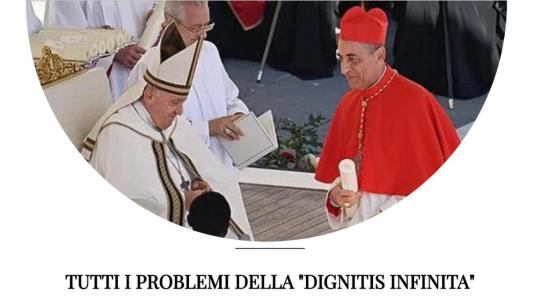
View On WordPress
#Apostasia#apostati#Bergoglio#bergoglioni#cattivi maestri#Dignitas infinita#falsi profeti#Fiducia Supplicans#fumo di satana#Giovanni Paolo II#henri de lubac#idiozie clericali#Jacques Maritain#naturalismo#papa Francesco#pena capitale#pena di morte#personalismo#sedicenti cattolici#spirito del concilio#Víctor Manuel Fernández
0 notes
Text
Deposta la Tiara, cosa resta al Papa? Solo se stesso?
Deposta la Tiara, cosa resta al Papa? Solo se stesso?
Con la Desiderio desideravi papa Francesco ha esposto il suo progetto di “riforma” che vuole imporre, frettolosamente, alla Chiesa di cui è temporaneo vicario e non “il Signore“. Ma come è possibile che un papa pretenda che il suo pensiero diventi magistero? Ciò è possibile perché Paolo VI, il vero modello papale di Francesco, depose sull'”altare del Vaticano II” qualcosa che non apparteneva ai…
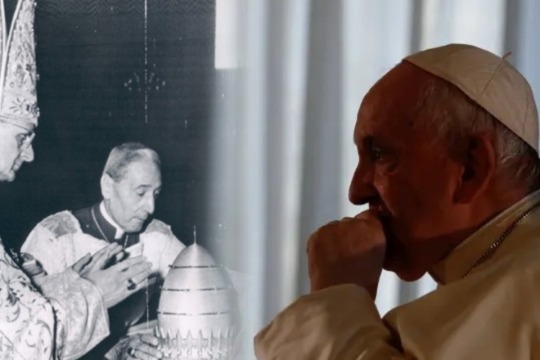
View On WordPress
#Bergoglio#bergoglionate#bergoglionismos#concilio vaticano ii#gesuiti#Henri de Lubac#Jorge Bergoglio#Jorge Mario Bergoglio#Nouvelle Theologie#paolo vi#Papa Bergoglio#papa Francesco#spirito del concilio#tiara#triregno#Yves Congar
0 notes
Text
“It is not a question of adapting Christianity to men, but of adapting men to Christ.”
- Fr. Henri de Lubac, Paradoxes of Faith
5 notes
·
View notes
Text
love ordering books from the “controversial literature” subject category of the library. very confused about what’s in that in general actually
#it's henri de lubac's the drama of atheistic humanism#which. don't understand why that's controversial for a book published in the mid 20th c#but we'll find out#like it's a criticism of atheism not FOR atheism ...
0 notes
Text
Buongiorno...
La vita è sempre
trionfo dell'improbabile
e miracolo dell'imprevisto.
Henri-Marie de Lubac

58 notes
·
View notes
Text
Torn Heavens
A homily on Isaiah 64:1 preached on the First Sunday of Advent 2023
at the Episcopal Church of St. Michael and St. George, St. Louis, Missouri
“O that you would tear open the heavens and come down.”
May I speak to you in the Name of God, the Father, the Son, and the Holy Spirit. Amen.
One of the ways people talk about religion and spirituality goes something like this: I feel something is missing from my life. I want more inner peace and fulfillment. I should explore some spiritual practices to try to get in touch with the Divine.
In our more desperate and honest moments, though, we know this isn’t quite right. Because our hunger seems larger than this. Yes, we want peace and a sense of fulfillment, but we want more than that. We want an intervention. We want not so much to be climbing the ladder to heaven as to have God reach down and rescue us when we’ve fallen off the ladder, when we’ve reached the end of our rope. We want not just our individual interior lives to be healed. We want our broken relationships restored. We want our financial insecurity to be resolved. We want illness and disease not to be able always to have the upper hand. We want the whole world to be different.
Right after the end of World War II, a French Catholic theologian and priest named Henri de Lubac published a book that has become a classic, titled Catholicism. He opens the book with a quotation that emphasizes the individualistic nature of so much of our spirituality: “The joy of Jesus can be personal. It can belong to a single [person] and [she or he] is saved… In his [or her] blessedness he passes through the battlefields with a rose in his hand.” The individual believer is serenely detached and untouched by the tumult, content with her own personal joy and beauty. But the quotation goes on. When disaster strikes, when suffering pulls the rug out from under our feet, then we realize our solidarity with all the other wounded lying on the battlefield: “My joy will not be lasting unless it is the joy of all. I will not pass through the battlefields with a rose in my hand.”
This is the sentiment that we heard a few moments ago in our reading from the Hebrew prophet Isaiah. Crying out to God, the prophet says, “O that you would tear open the heavens and come down.” It’s a striking image: the prophet looking up to the sky, screaming at God to show Himself — to pull back the curtain and come off His throne and come down into our human misery. It’s a far cry from an individualistic spirituality of interior, psychological ascent into realms of tranquility. It’s a plea for God to show up in the mire and muck of social, material human existence. It’s a call for God to act in history, in community, in cities and families and hospitals and businesses.
The verb the prophet uses — “O that you would tear open the heavens” — is, in the Greek translation, the word schizō. It means to rend or split apart. We get the word schism, a tear in social bonds, from it, and also the word schizophrenia. The prophet is begging God to split apart the sky and come out from hiding and intervene in the world.
And does God answer the prophet’s prayer? Does God answer our prayer?
In the first of the Gospels to be written, the Gospel of Mark, the evangelist uses that word schizō in two significant places in his story. The first is when Jesus is baptized in the Jordan river by John: “And just as he was coming up out of the water, he saw the heavens torn apart and the Spirit descending like a dove upon him.” John had been splashing water on Judeans who were sorry for their injustice and immorality: “the whole Judean region and all the people of Jerusalem were going out to [John] and were baptized by him in the River Jordan, confessing their sins.”
According to the witness of the New Testament, Jesus had no sins to confess. He lived at every moment with perfect love for God and His fellow human beings. And yet He went into the river along with all the penitents. Why? Because He knew that the healing we need could only come about through His sharing with us entirely in all our guilt and grief. What He was unwilling to put on His shoulders could not be healed in us. And so, even though He Himself was entirely innocent, He went down into the waters of baptism with us and for us.
And the Gospel of Mark says that that was the moment when Isaiah’s prayer was heard and answered. God tore open the heavens and came down. God ripped apart the curtain that He was hiding behind and showed up in our history, taking our failures and evils on Himself and taking them away.
The other place in the Gospel of Mark where that word schizō is used comes at the end of the narrative, when Jesus is hanging on the cross: “Then Jesus gave a loud cry and breathed his last. And the curtain of the temple was torn in two, from top to bottom.” There was a heavy, ornate curtain that separated the Most Holy Place, the Holy of Holies, from the rest of the temple and the world. It concealed and guarded the Presence of God, and only once a year, on the Day of Atonement, would the high priest enter in behind the curtain to offer sacrifice. Otherwise the curtain guarded the people from the devouring fire of God’s holiness. But now, at the moment of Jesus’ death, the curtain in the temple is torn apart — and it is not torn from the bottom up, from human beings’ attempt to access God’s presence. Instead it is torn from top to bottom, as Jesus’ death unleashes God’s presence into the world, not for conflagration but for salvation and new access and the ultimate restoration of all creation.
Many readers of these stories over the centuries have pointed out that once you violently rip something apart, it can’t be sewn back together very easily. Once the heavens are torn open, once the temple curtain has been rent from top to bottom, they can’t be closed up again.
And yet I, and I suspect you, often feel that they the tatters have been knit back together so that we can’t discern the presence of God and His salvation anymore. The world, and our lives, don’t look very saved right now. And that is why, during Advent, we look ahead to another great tearing apart of the heavens. St. Paul tells us by a word of the Lord that at the end, “the Lord himself, with a cry of command, with the archangel’s call and with the sound of God’s trumpet, will descend from heaven, and the dead in Christ will rise.” There will be yet one more splitting apart of the skies, another ripping of the curtain. And the dead will be raised, and all things will be made new.
Even so, come, Lord Jesus.
Amen.
9 notes
·
View notes
Text
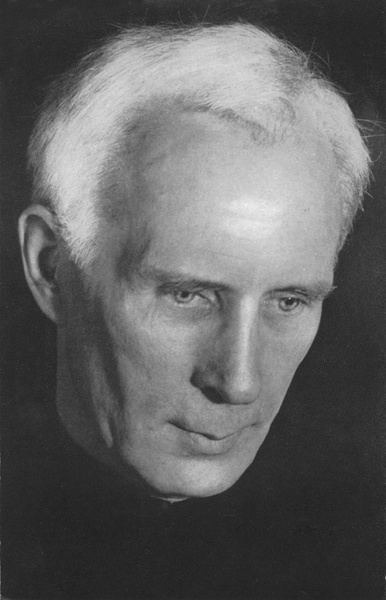
« Il n’est pas vrai que l’homme […] ne puisse organiser la terre sans Dieu. Ce qui est vrai, c’est que, sans Dieu, il ne peut en fin de compte que l’organiser contre l’homme. L’humanisme exclusif est un humanisme inhumain. »
Cardinal Henri de Lubac, Le Drame de l’humanisme athée (1944)
3 notes
·
View notes
Text
Perichoresis
Perichoresis (from Greek: περιχώρησις perikhōrēsis, "rotation") is a term referring to the relationship of the three persons of the triune God (Father, Son, and Holy Spirit) to one another. Circumincession is a Latin-derived term for the same concept. It was first used as a term in Christian theology, by the Church Fathers. The noun first appears in the writings of Maximus Confessor (d. 662) but the related verb perichoreo is found earlier in Gregory of Nazianzus (d. 389/90). Gregory used it to describe the relationship between the divine and human natures of Christ as did John of Damascus (d. 749), who also extended it to the "interpenetration" of the three persons of the Trinity, and it became a technical term for the latter. It has been given recent currency by such contemporary writers as Jürgen Moltmann, Miroslav Volf, John Zizioulas, Richard Rohr, and others.
Since Christians believe humans are made in the image of God, a Christian understanding of an adequate anthropology of humans' social relations is informed by the divine attributes, what can be known of God's activity and God's presence in human affairs. Theologians of the Communio school such as Hans Urs von Balthasar, Henri de Lubac, and Joseph Ratzinger (later Pope Benedict XVI) locate the reciprocal dynamism between God and God's creatures in the liturgical action of sacrament, celebrating the sacred mysteries in Eucharistic communion, in a hermeneutic of continuity and apostolic unity.

The relationship of the Triune God is intensified by the relationship of perichoresis. This indwelling expresses and realizes fellowship between the Father and the Son. It is intimacy. Jesus compares the oneness of this indwelling to the oneness of the fellowship of his church from this indwelling. "That they all may be one; as thou, Father, art in me, and I in thee, that they also may be one in us" (John 17:21). The great 12th century Cistercian reformer St. Bernard of Clairvaux spoke of the Holy Spirit as the kiss of God, the Holy Spirit being thus not generated but proceeding from the love of the Father and the Son through an act of their unified will.
If, as is properly understood, the Father is he who kisses, the Son he who is kissed, then it cannot be wrong to see in the kiss the Holy Spirit, for he is the imperturbable peace of the Father and the Son, their unshakable bond, their undivided love, their indivisible unity. – St. Bernard of Clairvaux, in Sermon 8, Sermons on the Song of Songs
The Cappadocian Fathers described the Trinity as three individualities in one indivisible being, asserting that Christian community is an analogy:[citation needed] that the social trinitarianism is—in Eastern Orthodox terminology—an "icon" or sign of God's love. Such a conception refutes the adoptionism which some attribute to the Anomoeans (an "Arian" sect) and other anti-trinitarians, which reduce the conception of the unity of God in Christ to a purely ethical concept, strictly comparable to a human relationship between two (or three) individuals. In contrast, the basis for human relationship pointed to by the Cappadocian Fathers is within God as such, not in God in relation to another that is not God.
[Source]
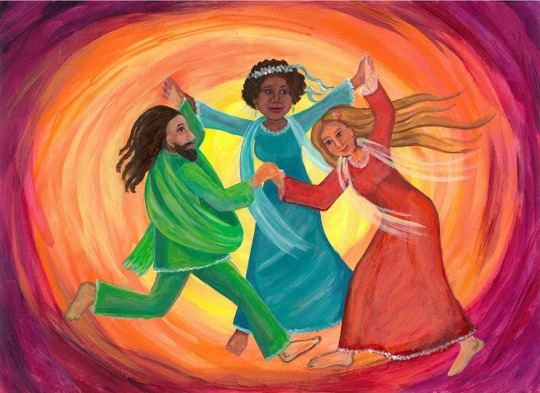
3 notes
·
View notes
Text
didn't realize the irony of wearing a tshirt ghat says "i am just a dog in gods hot car" while in a public park and reading Henri de Lubac's On The Discovery Of God
0 notes
Text
It is a personal and public obligation, a bond of communion with all other believers; such is the double reality signified and effected by the confession of faith in the recitation of the Creed. The fact that we say "credo" in the singular, and that we say it in common, is deeply significant. These two traits reinforce each other, for if the public commitment produces communion, the support of the community strengthens the commitment.
Henri de Lubac (The Christian Faith: An Essay on the Structure of the Apostles' Creed, page 352), trans. Richard Arnandez, F.S.C.
13 notes
·
View notes
Text
La necessità di contestualizzare le parole di Papa Francesco
Francesco è un papa garante, che chiede cambiamenti e nuovi processi e garantisce che tutto vada bene. Allo stesso tempo, è un papa che non ha paura di cambiare se le cose non vanno secondo quello che pensa o intende.
Continue reading Untitled
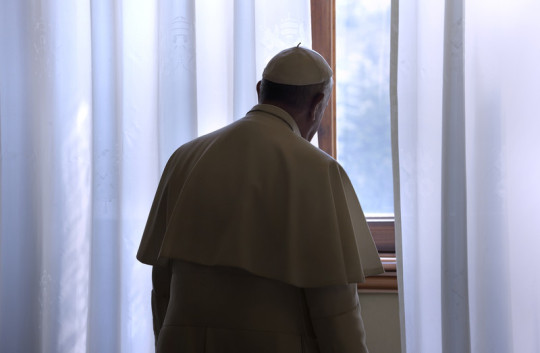
View On WordPress
#Angelo De Donatis#Apostasia#Bergoglio#bergoglionismos#cattivi maestri#falsi profeti#fumo di satana#gesuiti#henri de lubac#idiozie clericali#papa Francesco#sedicenti cattolici#spirito del concilio
0 notes
Text
1 note
·
View note
Quote
The soul in search of God … never passes from one stage of its ascension to the next except by a series of rejections and denials, for the beings which it questions on the road all reply: ‘We are not the God you are seeking.’
The Discovery of God, Henri de Lubac.
1 note
·
View note
Text
“Nothing remains intact without effort. Repetition of formulas does not assure the transmission of thought. It is not safe to entrust a doctrinal treasure to the passivity of memory. Intelligence must play a part in its conservation, rediscovering it, so to speak, in the process.”
- Fr. Henri de Lubac S.J., Paradoxes of Faith
3 notes
·
View notes
